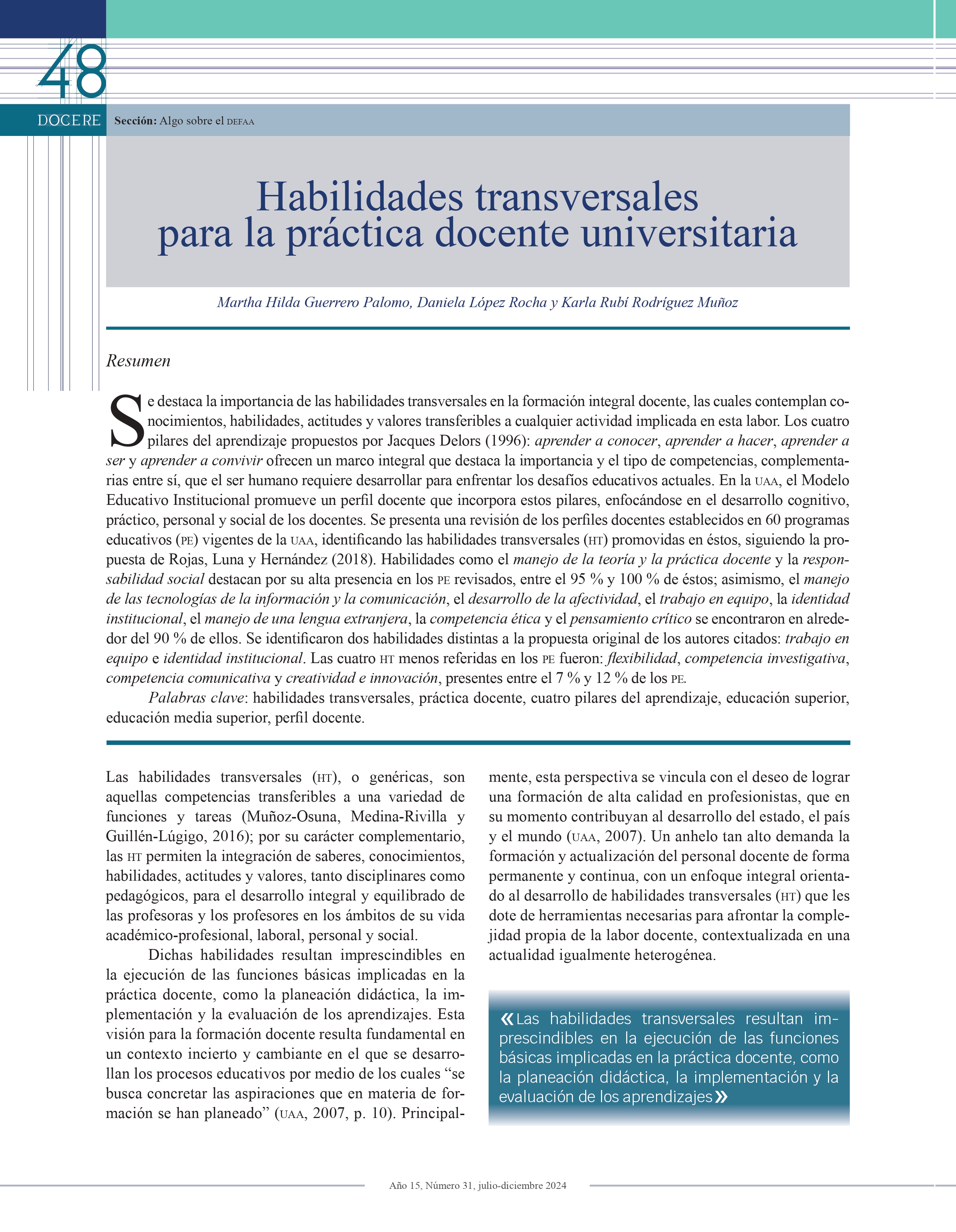Transversal Skills for the University Teaching Practice
DOI:
https://doi.org/10.33064/2024docere317863Keywords:
transversal skills, teaching practice, four learning pillars, higher education, upper secondary education, teacher’s profileAbstract
The present article highlights the importance of transversal skills in the comprehensive teacher education, which considers knowledge, skills, attitudes, and values that are transferable to any activity involved in this work. The four pillars of learning proposed by Jaques Delors (1996): “learning to know, learning to do, learning to be, and learning to live together”, provide a comprehensive framework that emphasizes the importance and the type of competencies that complement one another. These skills are essential for humans to develop in order to address the current educational challenges. In the Universidad Autónoma de Aguascalientes, the Institutional Educational Model promotes a teaching profile that incorporates these pillars by focusing on the cognitive, practical, personal, and social development of teachers. This article presents a review of the teacher profiles established in 60 current educational programs at UAA, identifying the transversal skills promoted following the framework of Rojas, Luna, & Hernández (2018). Skills as the management of theory and teaching practice as well as social responsibility are notable for their significant presence in the revised educational programs with approximately 95% to 100%. Similarly, the management of ICT, the development of affectivity, collaborative work, institutional identity, the management of a foreign language, ethical competence, and critical thinking were found in approximately 90% of the programs. Two skills that differ from the original framework proposed by the cited authors: teamwork and institutional identity were identified. The four least-mentioned transversal skills were flexibility, research competence, communicative research, and creativity and innovation, which appeared between 7 and 12% of the educational programs.
Translated by: Adán Israel Vázquez Alba.
Downloads
References
Delors, J. (Coord.) (1996). La educación encierra un tesoro. Informe a la Unesco de la Comisión Internacional sobre la Educación para el siglo XXI. Francia: Organización de las Naciones Unidas para la Educación, la Ciencia y la Cultura. https://unesdoc.unesco.org/ark:/48223/pf0000109590_spa.
Muñoz-Osuna, F. O., Medina-Rivilla, A. & Guillén-Lúgigo, M. (2016). Jerarquización de competencias genéricas basadas en las percepciones de docentes universitarios. Educación Química, 27(2), 126-132. https://doi.org/10.1016/j.eq.2015.11.002. DOI: https://doi.org/10.1016/j.eq.2015.11.002
Rojas Zapata, A. F., Luna Hernández, J. A. & Hernández Arteaga, I. (2018). Competencias docentes transversales para el quehacer de profesores de pregrado en Psicología. Educación y Educadores, 21(3), 461-481. https://doi.org/10.5294/edu.2018.21.3.5 DOI: https://doi.org/10.5294/edu.2018.21.3.5
Universidad Autónoma de Aguascalientes. (2007). Modelo Educativo Institucional. Correo Universitario, séptima época, (15) [1ª reimp.], 29 de mayo de 2015. México: UAA. https://acortar.link/3OPKRv.
Universidad Autónoma de Aguascalientes. (2013). Programa Institucional de Formación y Actualización Docente (PIFOD). México: UAA-DGDP-DEFAA. https://acortar.link/hWz5t2.

Downloads
Published
How to Cite
Issue
Section
License
Esta obra está bajo una Licencia Creative Commons Atribución-NoComercial-CompartirIgual 4.0 Internacional.
El lector y/o usuario que utilice el material publicado en la revista DOCERE de la Universidad Autónoma de Aguascalientes, deberá en todos los casos: a) Reconocer la autoría del material utilizado, proporcionando un enlace a la licencia, además de indicar sí se han realizado cambios al material; b) Queda prohibido utilizar el material proveniente de la revista DOCERE, con finalidad comercial y, C) En los casos en los que se realice la remezcla, transformación o creación, a partir del material publicado de la revista DOCERE, se deberá dar reconocimiento de los derechos que correspondan a la Universidad Autónoma de Aguascalientes, en su carácter de titular de la materia protegible utilizada. En caso de infracción a lo antes dispuesto, el lector y/o usuario, se hará acreedor a las sanciones que establece la legislación de la materia.












